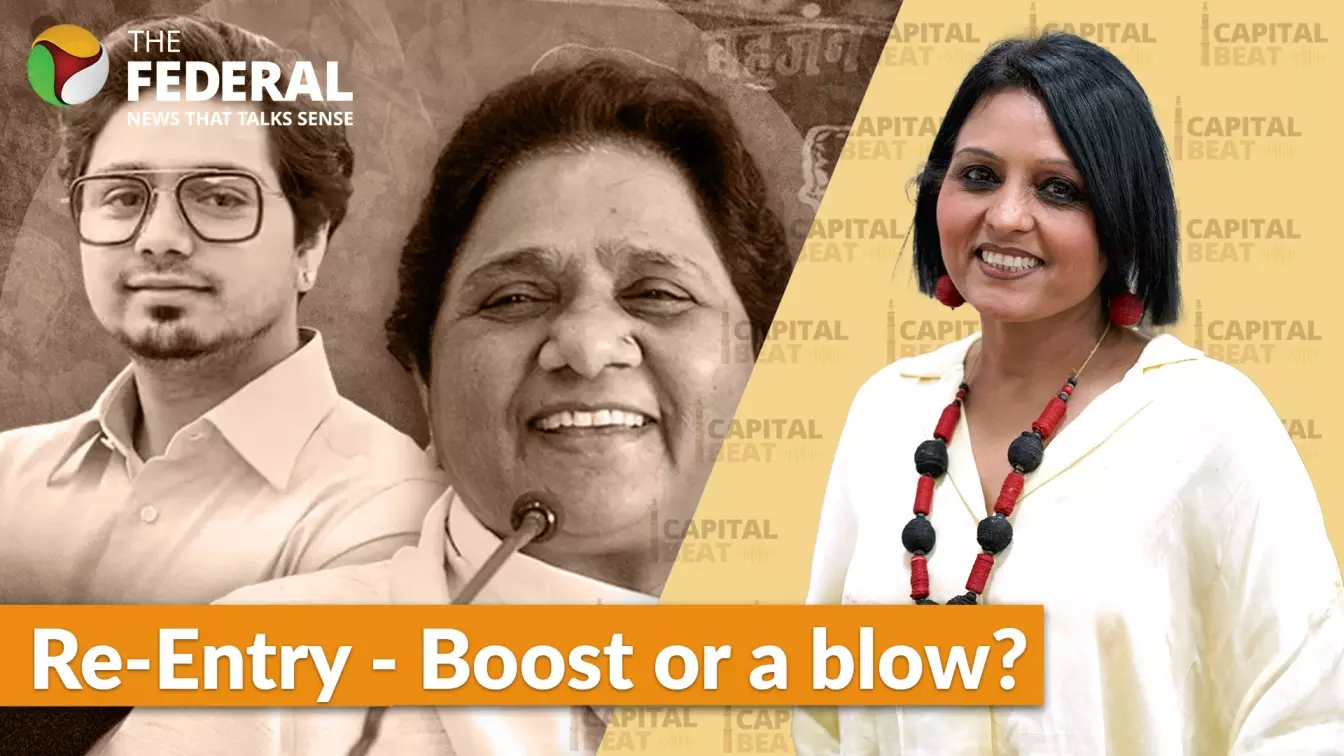
Mayawati takes back Akash Anand
Uttar Pradesh: Can Akash Anand's return revive Mayawati's BSP? I Discussion
After his expulsion, Akash Anand returns to BSP with Mayawati’s approval. But does this move show strength—or signs of internal cracks?

In the latest episode of Capital Beat, Federal's panel delved into the political implications of Akash Anand's return to the Bahujan Samaj Party (BSP). The panellists, advocate and activist Priyadarshi Telang and Dinesh Chandra, a Dalit politics expert, shared their views on whether Mayawati's nephew's comeback would revive the party or further damage its credibility.
Internal dynamics questioned
Akash Anand, once declared Mayawati's political heir, was expelled last month for allegedly allowing his father-in-law Ashok Siddharth to interfere in party affairs. However, after a public apology and vow to keep personal relations out of party matters, Mayawati reinstated him.
"The reason cited for his expulsion and now his return is childish," said advocate Priyadarshi Telang. He criticized the BSP's functioning style, calling it immature and lacking internal democracy.
Telang quoted Dr. Ambedkar: "Bhakti in religion may lead to salvation, but in politics it leads to dictatorship," arguing that Akash Anand's pledge to follow only Mayawati's instructions showed an undemocratic attitude.
Impact on party morale
The panel agreed that the decision could demotivate the party cadre. "Taking him back is further confusing voters," said Dinesh Chandra. "Mayawati has no other successor. That's why she brought him back."
Also Read: Holi vs Ramadan: Is Religious Harmony Fading in Uttar Pradesh?
Chandra also pointed out that Mayawati’s refusal to name a successor as long as she is alive was a political blunder. "It shows there’s no democratic mechanism in BSP today," he added.
Rebuilding lost trust
BSP’s vote bank has significantly eroded over the years, particularly among Dalits and backward castes. Telang emphasized that although Akash Anand initially brought energy to the party, his removal and reinstatement without clarity have undermined public trust.
He noted that if BSP continues to ignore internal dialogue and fails to accommodate new leadership, it will struggle to remain relevant. "Mayawati needs to come out of her cocoon and allow grassroots leadership to emerge," Telang said.
Centralisation versus decentralisation
The discussion turned to the centralised nature of political parties in India. Telang argued that while all parties exhibit some level of centralisation, the BSP's current functioning lacks transparency and democratic checks.
He highlighted that despite constitutional frameworks for internal party elections, in practice, party heads maintain tight control. “Every leader tries to centralise power. Mayawati is no exception,” he said.
Wider implications for Dalit politics
The panel discussed the future of Dalit representation in politics. With the emergence of new leaders like Chandrashekhar Azad, there are concerns that Mayawati is losing ground in the broader Dalit movement.
"Dalit movement is bigger than BSP," said Chandra. He noted that while the party was a product of Dalit social consolidation, it has now drifted from its original goals. "Even if BSP fades, the movement will continue," he added.
Need for inclusive leadership
Both panellists called for BSP to open its doors to diverse and competent leadership. "There are many capable leaders in Lucknow alone who could take BSP forward," said Chandra. "But the current leadership doesn’t want them."
He warned that without such inclusion, the party's future remains bleak. Telang agreed, saying that unless BSP accommodates the changing needs and voices within the Dalit community, it risks further irrelevance.
Caste census and political shifts
The debate concluded with reflections on current caste-based politics. As national parties engage with caste identity and census data, BSP must respond strategically.
"Mayawati hasn’t completely lost the game," said Chandra. "But the way Akash Anand was reinstated has left many confused."
The episode concluded with a consensus that BSP still has an opportunity to revive, but only if it rethinks its leadership model and connects with grassroots Dalit voices.
The content above has been generated using a fine-tuned AI model. To ensure accuracy, quality, and editorial integrity, we employ a Human-In-The-Loop (HITL) process. While AI assists in creating the initial draft, our experienced editorial team carefully reviews, edits, and refines the content before publication. At The Federal, we combine the efficiency of AI with the expertise of human editors to deliver reliable and insightful journalism.

